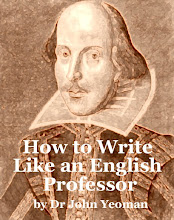 e question is not as absurd as it may at first appear. For centuries, scholars have wrestled with the Shakespeare authorship question. How ever did the son of a Stratford glover, with limited education, emerge as England's premier wordsmith?
e question is not as absurd as it may at first appear. For centuries, scholars have wrestled with the Shakespeare authorship question. How ever did the son of a Stratford glover, with limited education, emerge as England's premier wordsmith?Attempts to uncover his identity as Bacon, Marlowe or Oxford have foundered because they rest upon implausibilities even more absurd than those which suppose Shakespeare to have been a polymath (with no evidence of a library) having unprecedented verbal skills. Indeed, they defy the 'coherence of probabilities'.
First, Bacon was far too busy with civic affairs to churn out - in his spare time - as many as four plays in a year, as Shakespeare attestedly did in 1593-4 and 1599-1600. 'Proofs' of Bacon's signature encoded throughout the works in anagrams are risible. The scripts never stayed the same from one play night to the next, as the many variorium editions of the Folios suggest. For an anagram to be decryptable, it must be encoded in a durable and published text. Shakespeare (or whoever wrote his plays) never showed the slightest interest in publishing his evanescent scripts.
Moreover, the modern Dan Brown craze for finding expedient cryptograms in everything - famously exemplified by Drosnin's lucrative The Bible Code - was laughed to scorn even in the sixteenth century (see Montaigne's Essais, 1580).

Kit Marlowe is a candidate even less plausible. He died on 30th May 1593 yet many of Shakespeare's most famous plays were not only produced up to nine years later but also some, like Macbeth and The Tempest, are indisputably grounded upon contemporary events unknowable to the 16th century Marlowe.
Only Oxford remains a feasible candidate, but he exhibited little wit or genius in those writings attributed to him.
All textual quibbles aside, the clearest impartial evidence that Shakespeare was, well, Shakespeare comes from his close friend Ben Jonson. If someone other than Shakespeare had written the plays (perhaps a Marlowe recidivus lurking in the closet?), Jonson would have known it. So would Shakespeare's early paymaster, Burbage, and all the other major actors like Kemp. (Who fell out with Shakespeare and was not noted for his discretion.) This hints at a massive conspiracy. Yet Jonson gives no hint of it in his candid memoires Discoveries, published 1640 and written in the 1630s, nearly twenty years after Shakespeare's death.
No. Shakespeare was Shakespeare. So how was he able to write so well?
BRUTUS is a software programme developed at MIT that already composes convincing short stories indistinguishable from those written by a human author, but without human mediation. It is not impossible that the recuperation of Love’s Labours Won is next on its agenda.
See: http://www.aaai.org/aitopics/pmwiki/pmwiki.php/AITopics/Drama
Just suppose some futuristic university English dept had encrypted BRUTUS into algorithms as small as a virus, and time-flown them back to 1585, and implanted them in Shakespeare when he first left Stratford to make his fortune in London? Time travel? I am not privy to the technologies of future English depts. Unethical? Not for English depts. Trust me. I know these guys.
Suffice to say, this simple explanation entirely clears up the authorship question. In fact, MIT patently acknowledges that its program wrote Shakespeare. Why else would the program have embedded in Julus Caesar the explicit clue: 'Et tu, Brute?'.




